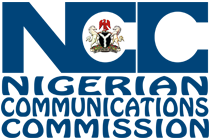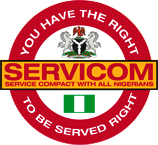 |
NIGERIAN COMMUNICATIONS COMMISSION
|
 |
INTRODUCTION
The Consumer Affairs Bureau (CAB) is structured into three units namely:
- Consumer Information and Education (CIE) Unit
- Consumer Policy Development & Monitoring (CPDM) Unit
- Consumer Protection & Advocacy (CPA) Unit
LOCATION
2nd & 3rd Floor,
Nigerian Communications Commission Annex Building,
Plot 1253 Cadastral Zone C06,
Mbora District,
Abuja, FCT.
HEAD OF DEPARTMENT
Dr. Ikechukwu Adinde
Tel: 09-4618181 or 09-4617000,
Email:
MISSION STATEMENT
To ensure the protection of the rights, privileges and interests of telecommunications consumers, including the Differently Abled Persons through adequate information dissemination, outreach programs as well as effective policies and strategies that promote telecoms service delivery.
VISION STATEMENT
A world class telecoms industry with well informed, empowered and satisfied consumers.
THE PIE MANDATE
"To Protect, Inform and Educate (PIE) Telecom Consumers"
MOTTO
‘Take advantage of us so that no one takes advantage of you’.
KEY STAKEHOLDERS
- Telecom Consumers
- Telecom Service Providers
- Consumer Advocacy Groups
- Internal Stakeholders (Departments and Staff of NCC)
- Arms of Government (particularly the Executive and the Legislative)
- Ministries, Departments and Agencies (MDAs) of Government including but not limited to FCCPC, NESREA, CBN, NLRC, APCON, SERVICOM, etc.
- Event Managers/Consultants
SERVICE PROVISION
- To empower consumers through information-sharing, education and other forms of awareness creation via engagements across media and channels as well as at outreach events that include Telecom Consumer Parliament (TCP); Telecom Town Halls on Radio (TTHR); Telecom and the Citizens (A Twitter Live Chat); Consumer Conversations; The Television Dialogue; Consumer Web Portal; Social Media Networks; Trade fairs, Exhibitions and Conferences; Information Education and Communication (IEC) materials in texts and audio-visual; Telecom Consumer Handbook; Dedicated Complaints Management through Toll Free line (622) Trade fairs & Exhibitions. All underpinned by baseline studies, research, and periodic National Industry Consumer Satisfaction Surveys.
- To develop policies, guidelines and regulatory interventions to protect the rights, privileges and interest of Consumers.
- To facilitate redress for dissatisfied consumers.
- To ensure accessible customer care services to consumers.
- To give a voice to consumers irrespective of their socio-economic status.
- To facilitate efficient consumer-operator interface for complaints management.
- To collaborate with Consumer Advocacy Groups.
SERVICE DELIVERY
The Bureau is dedicated to discharging the above services to all its stakeholders by developing innovative strategies, delivered professionally with integrity to achieve excellence, hence our motto is: ‘Take advantage of us so that no one takes advantage of you’.
MONITORING OF CUSTOMER SATISFACTION AND PROVISION OF MATERIALS
On a regular basis, the Bureau carries out a nationwide Consumer Satisfaction Survey to measure the quality of consumer experience, evaluate consumer feedback and develop policies to improve the consumer satisfaction index.
In addition, CAB develops information to produce IEC materials in print and digital formats, roll–up banners and related contents which are disseminated across public media and through the Bureau-managed Consumer Web Portal and dedicated Twitter account (@consumerncc). The Bureau particularly engages the online community through its online platform, the Consumer Web Portal (www.ncc.gov.ng/consumers) and the twitter handle (www.twitter.com@consumerncc).
CONSUMER COMPLAINTS MANAGEMENT PROCESS
Through the Consumer Affairs Bureau, the Commission offers Second Level Support (SLS) to aggrieved consumers and encourages consumers to get in touch with the Service Providers’ Contact Centers first, after which non-satisfied consumers can utilize the NCC toll free line 622 to escalate complaints. Consumers may also use the Complaint form located on the Consumer Web Portal: www.ncc.gov.ng/consumer to lodge complaints.
Indeed, the Bureau also acts on letters addressed directly to the Commission by consumers seeking redress for poor services
STAKEHOLDERS OBLIGATIONS
To enable the Consumer Affairs Bureau (CAB) to function optimally, stakeholders are required to comply with existing regulations and guidelines that have been emplaced for consumer complaint governance. Accordingly, the following stakeholders are expected to act as follows:
- SERVICE PROVIDERS:
- Develop and comply with an approved Individual Consumer Codes and guidelines culled from the Consumer Code of Practice Regulations 2007
- Comply with Guidelines on Adverts and promotions
- Comply with all other legal regulatory guidelines and provisions with respect to Consumers, for example, the compliance with Complaints Categories and Service Level Agreements (SLAs) on complaint resolutions.
- CONSUMERS:
- Must avail themselves of opportunities instituted to be informed via the various avenues provided by the Bureau through its publications, media based programmes, social media handles, events and consumer outreach programmes.
- Know their rights and Obligations to the Service Providers
- Seek redress by following laid down processes and procedures.
GRIEVANCE REDRESS MECHANISM
FOR ANY COMPLAINT:
Contact your service provider, if still dissatisfied;
Call the NCC Toll Free Number NCC- (622)
For Online Complaints send an email to;
For further information, please follow us on:
- https:// www.ncc.gov.ng
- https://www.facebook.com/nigerian.communications.commission
- https://www.twitter.com/@NgComCommission
- https://www.twitter.com/@ConsumersNCC
- https://ng.linkedin.com/company/nigerian-communications-commission
- https://www.instagram.com/ngcomcommission
- https://www.youtube.com/user/NgComCommission
- https://consumer.ncc.gov.ng/
NIGERIAN COMMUNICATIONS COMMISSION
Plot 423, Aguiyi Ironsi Street, Maitama, Abuja.
+234-9-4617000
www.ncc.gov.ng
LIMITATIONS
The major limitation is the non-adherence of the Service Providers to the Commission’s directives and regulations, as well as the increasing propensity of consumers to lodge complaints with the Commission directly, and some directly to high authorities through social media platforms rather than report to their service providers first. Lodging complaints with the Service Provider is the first stage of the grievance process. If/when the complaint is not satisfactorily resolved, the consumer may then escalate the issue to the Commission.
CONCLUSION
There is a paradigm shift from mere service provision to consumer satisfaction which is key to building a sustainable telecommunication industry. The Consumer Affairs Bureau is poised to creating a service delivery model in line with the vision of the Commission and the Federal Government’s vision for a digital economic system.